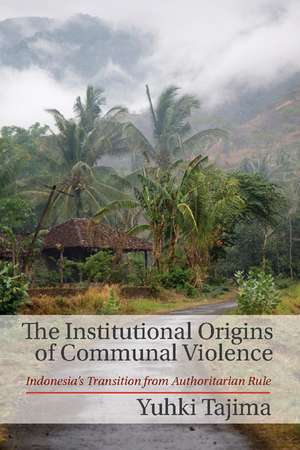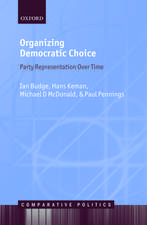The Institutional Origins of Communal Violence: Indonesia's Transition from Authoritarian Rule
Autor Yuhki Tajimaen Limba Engleză Hardback – 27 iul 2014
Preț: 691.66 lei
Preț vechi: 777.15 lei
-11% Nou
Puncte Express: 1037
Preț estimativ în valută:
132.34€ • 138.92$ • 109.85£
132.34€ • 138.92$ • 109.85£
Carte tipărită la comandă
Livrare economică 11-25 aprilie
Preluare comenzi: 021 569.72.76
Specificații
ISBN-13: 9781107028135
ISBN-10: 1107028132
Pagini: 224
Ilustrații: 3 b/w illus. 3 maps 11 tables
Dimensiuni: 156 x 235 x 18 mm
Greutate: 0.45 kg
Ediția:New.
Editura: Cambridge University Press
Colecția Cambridge University Press
Locul publicării:New York, United States
ISBN-10: 1107028132
Pagini: 224
Ilustrații: 3 b/w illus. 3 maps 11 tables
Dimensiuni: 156 x 235 x 18 mm
Greutate: 0.45 kg
Ediția:New.
Editura: Cambridge University Press
Colecția Cambridge University Press
Locul publicării:New York, United States
Cuprins
1. Introduction; 2. An institutional theory of intercommunal order and violence; 3. Building and constraining the Indonesian state; 4. The problem of local order: a view from the kampung; 5. A microstatistical test of the theory; 6. Small-scale communal conflicts: Lampung Province; 7. Outbreaks of large-scale communal conflicts; 8. The theory in comparative perspective; 9. Conclusion.
Recenzii
'In this book, Yuhki Tajima combines bold theorizing and painstaking analysis to draw profound lessons from the wave of violence that accompanied Indonesia's democratic transition. Highlighting the interaction between state interventions and informal institutions, he makes a major contribution to our understanding of communal violence and order.' Edward Aspinall, Australian National University, Canberra
'Yuhki Tajima joins the debate on collective violence in post-New Order Indonesia with a powerful deployment of village- and census-level data, careful theory construction, and process analysis of multiple local settings. This intelligent book promises to bring Indonesia to the center of broader scholarship on the origins of communal violence.' Benjamin Smith, University of Florida
'In The Institutional Origins of Communal Violence, Yuhki Tajima skillfully links the shifting politics of government security policies to the eruption of communal violence in democratizing Indonesia. This book provides an important and creative new perspective on the intertwining of state and non-state violence.' Paul Staniland, University of Chicago
'Tajima argues that 'mismatches between formal and informal institutions' explain violent conflict in post-New Order Indonesia. …The book offers a useful contribution by drawing attention to the importance of non-state, local forms of policing and conflict prevention that have been effective at preventing violence in the absence of state enforcement.' Jacques Bertrand, Bulletin of Indonesian Economic Studies
'Yuhki Tajima joins the debate on collective violence in post-New Order Indonesia with a powerful deployment of village- and census-level data, careful theory construction, and process analysis of multiple local settings. This intelligent book promises to bring Indonesia to the center of broader scholarship on the origins of communal violence.' Benjamin Smith, University of Florida
'In The Institutional Origins of Communal Violence, Yuhki Tajima skillfully links the shifting politics of government security policies to the eruption of communal violence in democratizing Indonesia. This book provides an important and creative new perspective on the intertwining of state and non-state violence.' Paul Staniland, University of Chicago
'Tajima argues that 'mismatches between formal and informal institutions' explain violent conflict in post-New Order Indonesia. …The book offers a useful contribution by drawing attention to the importance of non-state, local forms of policing and conflict prevention that have been effective at preventing violence in the absence of state enforcement.' Jacques Bertrand, Bulletin of Indonesian Economic Studies
Notă biografică
Descriere
This book develops a novel theoretical explanation for why transitions from authoritarian rule are often marked by spikes in communal violence.















